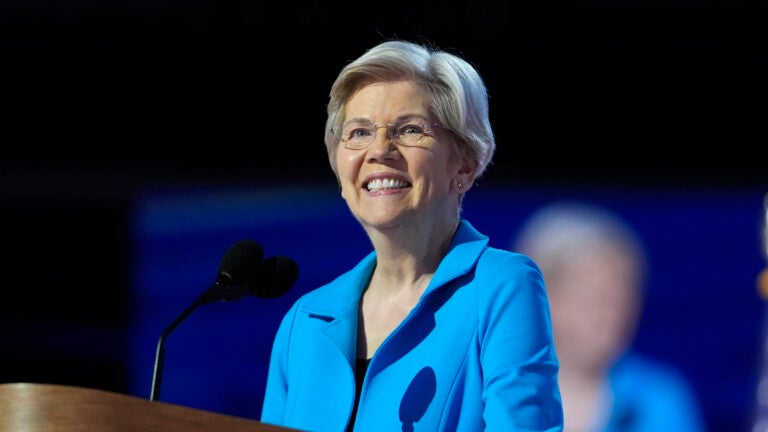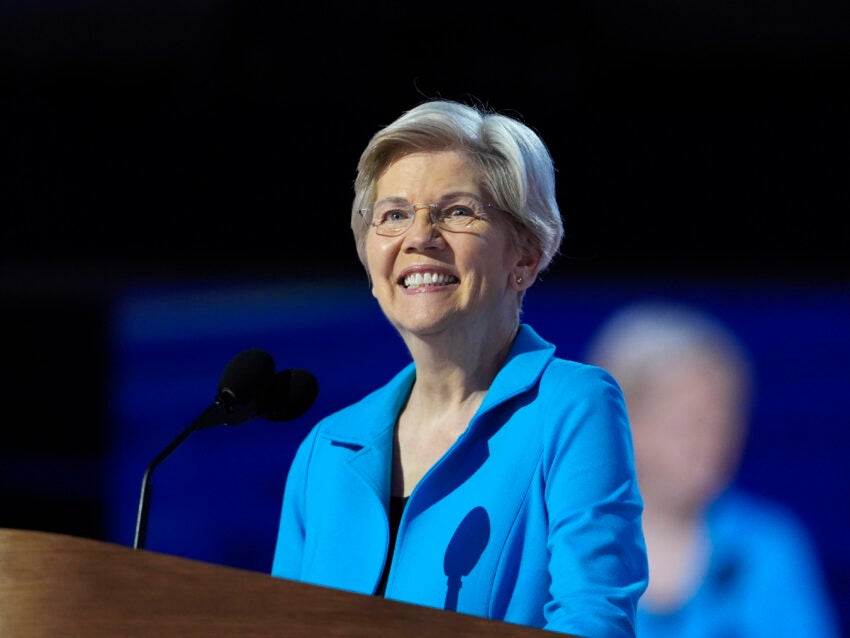Crypto
Local News
Crypto Sen. Elizabeth Warren appears well-positioned to defeat Republican John Deaton and win a third term in the U.S. Senate.

Since taking office in 2013, Sen. Elizabeth Warren has become one of the nation’s most well-known progressive lawmakers. Six years ago, she won a second term by easily defeating an ally of Donald Trump. Warren attempted to capitalize on this momentum by launching a bid for the White House in 2020, but was forced to bow out amid a crowded primary field. This election season, Warren is working double duty as a significant surrogate for Vice President Kamala Harris even as she competes with Republican John Deaton for her Senate seat.
Deaton, a personal injury attorney and outspoken advocate for the cryptocurrency industry, has sought to position himself as a moderate not beholden to Trump. Polling suggests he is fighting an uphill battle, and that Warren holds a commanding lead heading towards Election Day.
Last week, Boston.com caught up with Sen. Warren to discuss Deaton, what she learned from her presidential campaign, the danger she believes Trump poses to the country, and more.
The following interview has been lightly edited and condensed for clarity.
Boston.com: We recently saw John Deaton win the endorsements of two very different billionaires: Elon Musk and Mark Cuban. Musk has been campaigning for former President Trump, while Cuban is a big supporter of Vice President Harris. What’s your reaction to those two endorsements of your opponent?
Elizabeth Warren: Elon Musk is working with Donald Trump to try to take over our government, the White House and Congress. Evidently, Elon Musk sees John Deaton as part of that plan. Other crypto billionaires have weighed in for Deaton hoping just to knock me out of this Senate seat so that they won’t have to deal with my calls for some basic safety regulations on crypto.
John Deaton has repeatedly talked about the importance of term limits and he’s criticized you by saying that you spend more time in Washington than in Massachusetts, that you’re a political insider. You took office more than a decade ago. How are you different today than you were then?
Elizabeth Warren: We do have term limits, they’re called elections. Every six years, senators have to go back to the people who elected them and explain both what they’ve done and what they hope to do if they’re reelected. It’s the honor of a lifetime so fight on behalf of the people of Massachusetts in Washington.
I have gotten a lot done, including bringing more than $20 billion home to Massachusetts for infrastructure, climate, and science spending in just the past couple of years. I’ve gotten $35 insulin, a $2,000 cap on seniors’ out-of-pocket costs on prescription drugs, and helped get rid of many junk fees.
If the people of Massachusetts send me back to Washington, I’ll fight to make Roe v. Wade the law of the land, which will take a Democratic majority to get done. I’ll also fight for voting rights and to pass the PRO Act so that anybody who wants to join a union can do so. And I’ll put my energy into universal childcare and a big federal investment in housing so that we can build out our housing stock here in Massachusetts and lower costs for first-time home buyers, seniors, veterans, and others who need housing.
Thinking back on your career, what lessons did you learn from your presidential bid in 2020?
Elizabeth Warren: Talking about policy matters. I can give you a couple very specific examples, but here’s one in particular. When I ran for president, I knew that it was a longshot, but I also knew that every day I was in the race, I could be in the fight for things I believe in. One of the ideas I highlighted was a 15% minimum tax on billionaire corporations like Amazon that are paying effectively nothing in federal income taxes. People told me it was just a pipe dream and that Congress would never do something like that. But I fought for it every day.
After the race was over, the primary was over, I kept talking about it with other senators so that when the proposal was on the table in 2022 for the biggest climate package in the history of the world, it couldn’t go forward without a way to pay for it. I put my 15% minimum tax up as the possible way to pay for it, and every other senator agreed, and that minimum corporate tax is now law. It is paying for climate infrastructure and new construction and electric school buses and solar panels all around our commonwealth and around the country. Ideas matter.
Every day we’re seeing more horrific reports out of the Middle East, out of Gaza, out of Lebanon. It seems pretty clear that the U.S. has failed to reign in Prime Minister Netanyahu. Does the US need to seriously consider an arms embargo on Israel?
Elizabeth Warren: Yes. In fact, the federal government announced recently that, if Israel didn’t change its practices in Gaza, that it would end all arms shipments. I strongly support that.
Vice President Harris recently said that she believes Trump is a fascist. Would you use that term to describe him?
Elizabeth Warren: I listen to the people who worked most closely with Trump, including his chief of staff. They make it clear that Trump wants to be a dictator. Trump has himself said he wants to be a dictator, and has admired Hitler’s generals for their unquestioning loyalty. When someone like Donald Trump tells us who he is, we should believe him.
The Editorial Board of The New York Times just put out a piece essentially making that same argument, that we should believe him.
Elizabeth Warren: Yeah, believe him! I think that’s exactly the right way to understand this. It’s shocking to people to hear that, but it’s Trump who is putting the evidence in front of us. We need to understand just how dangerous this man is.
Quickly, what do you think of Question 1 in Massachusetts, which would open a pathway for the Legislature to be audited?
Elizabeth Warren: Yes. I’m a yes on Question 1.
And you’re also in favor of Question 2, which would eliminate the MCAS as a high school graduation requirement, correct?
Elizabeth Warren: I am. I should add that I’m a “yes” on Question 2 in part because I was a special ed teacher and I learned early on that one kind of test is not the only measure for accomplishment for our children. I listen to the teachers who are in classrooms, and they tell me about the damage of focusing on one test repeatedly, so that a handful of children are pulled out of the classroom and told repeatedly that they are failures, while everyone else is a success. I think we should listen to the teachers who have helped us build the best education
